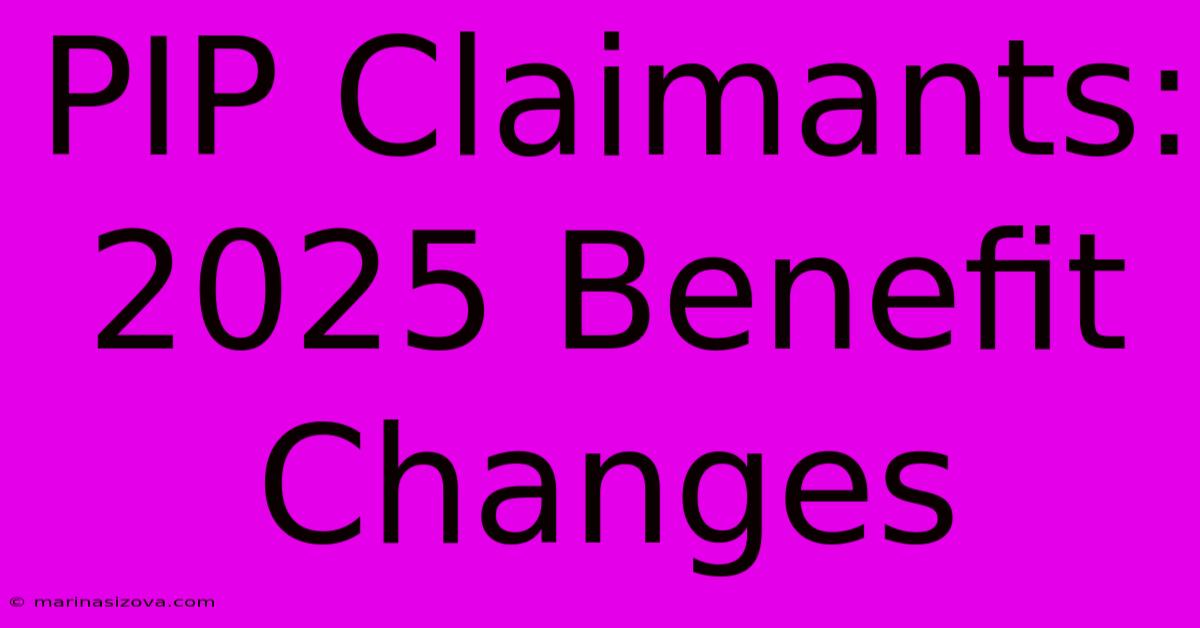PIP Claimants: 2025 Benefit Changes

Discover more detailed and exciting information on our website. Click the link below to start your adventure: Visit Best Website. Don't miss out!
Table of Contents
PIP Claimants: What to Expect from 2025 Benefit Changes
The Personal Independence Payment (PIP) is a benefit designed to help individuals with long-term health conditions or disabilities with the extra costs of living. While it's a vital lifeline for many, proposed changes to the PIP assessment process have sparked uncertainty and anxiety among claimants.
What are the proposed changes?
The Department for Work and Pensions (DWP) is planning to overhaul the PIP assessment process in 2025. These changes include:
- Shifting to a digital-first approach: This means assessments will primarily be conducted online, with face-to-face assessments only offered in exceptional circumstances.
- Introducing a new assessment tool: The DWP is developing a new, digital assessment tool to replace the current paper-based system. The aim is to make the process more efficient and user-friendly.
- Potential changes to descriptors: There are ongoing discussions about how the existing descriptors, which define how someone's needs are assessed, might be revised.
Why are these changes happening?
The DWP states that the changes are intended to:
- Simplify the assessment process: By moving to a digital system, the DWP hopes to streamline the assessment process, making it quicker and more efficient for both claimants and assessors.
- Improve accuracy: The new assessment tool is designed to be more robust and user-friendly, potentially leading to more accurate assessments.
- Reduce unnecessary face-to-face assessments: Shifting to a digital-first approach is intended to reduce the number of face-to-face assessments, thereby saving both time and resources.
Concerns and impact on claimants:
While the DWP highlights the potential benefits of these changes, many PIP claimants are understandably concerned about the impact on their benefits.
Here are some key concerns:
- Accessibility issues: Not all claimants have equal access to digital technology or the skills needed to navigate online assessments. This could disadvantage claimants who are already struggling with their health condition.
- Lack of clarity on descriptor changes: Uncertainty surrounding potential descriptor changes is causing anxiety for many claimants, as any modifications could impact their eligibility and benefit amount.
- Increased bureaucracy: The DWP's claim that the new system will be simpler and more efficient is being met with skepticism by many claimants. Concerns about increased bureaucracy and complexity within the digital system are rife.
What should PIP claimants do?
It's crucial for PIP claimants to stay informed about the upcoming changes. Here's what you can do:
- Keep up-to-date with official announcements: Follow the DWP's website and other reliable sources for the latest news and information about the changes.
- Join support groups: Connect with other PIP claimants and share your concerns and experiences. Support groups can provide a valuable space for information sharing and advocacy.
- Contact your MP: If you're concerned about the potential impact of the changes on your benefits, contact your local MP and express your worries.
- Seek advice from organizations like Citizens Advice: These organizations can offer guidance and support to navigate the PIP assessment process and advocate on your behalf.
The future of PIP:
The proposed changes to the PIP assessment process are still in development and subject to ongoing consultations. It's important for claimants to stay engaged and advocate for their rights. By staying informed, raising concerns, and working together, claimants can ensure the new system is fair, accessible, and meets their individual needs.
Remember, PIP is a lifeline for many individuals. It's essential that any changes to the system are implemented carefully and thoughtfully, ensuring that those who rely on this benefit continue to receive the support they need.

Thank you for visiting our website wich cover about PIP Claimants: 2025 Benefit Changes. We hope the information provided has been useful to you. Feel free to contact us if you have any questions or need further assistance. See you next time and dont miss to bookmark.
Featured Posts
-
Recortes De Volkswagen 4 000 Millones De Euros
Oct 29, 2024
-
Forum Textil Superando Desafios Do Setor
Oct 29, 2024
-
Brasilien Tote Und Verletzte Bei Fussball Krawallen
Oct 29, 2024
-
Engelbert Laegger Till Fastighet I Los Angeles
Oct 29, 2024
-
Schjelderup Scorer I Benficas Overlegne Seier
Oct 29, 2024
